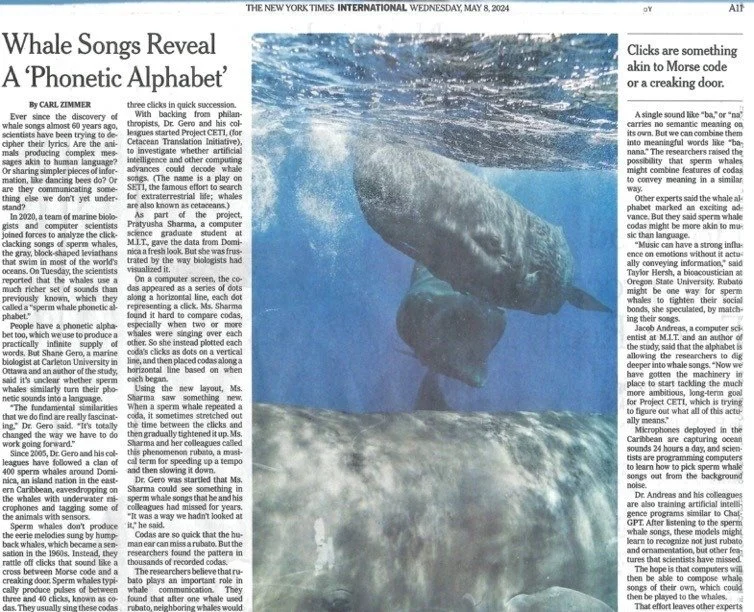Chapter 6: Phonetic Alphabet?
"Now I know my A-B-C's"
This video is amazing and something you should ponder. Shot by Patrick Dykstra yesterday, what you are seeing might best be described as a whale cleaning station. Patrick wrote these words for me: "We had a crazy encounter with a whale looking like it was at the cleaning station. Layed there covered in fish. I've never seen anything like it. (If Patrick has never seen anything like it then I'd venture a guess that nobody else has either) "Sharks are known to visit places on reefs where small fish aggregate that "clean" them. They have a deal that the shark won't eat the cleaner fish and the fish go all around the shark, including in its mouth, to clean out rotting fish bits and dead skin. As far as I am aware, that has never been witnessed in whales. However, that sure looked like what was happening here."
I asked Patrick, "is that "cleaning station" video something we should be sharing? Wouldn't you copyright that for yourself? It's worth something, yes?"
"Share away," he replied. "I don't really worry about that kind of thing. I hope people see it and learn something. No serious broadcaster (Netflix, BBC etc) would ever use something without the owner signing a contract anyway, so the only risk it ends up on someone else's Youtube or whatever. All good."
That exchange tells you a lot about this man. I am taken aback by his lack of selfishness.
These amazing gentle sperm whales are just like us in many ways. They are mammals who breathe air. They create and maintain social and travel groups. They throw unruly adolescent males out of the group. They are unlike us in other ways. They can live for two centuries. They don't invite those adolescent males back. (They become adults and mate with other groups far away.)
An American military engineer in Bermuda created a sound disc in the nineteen sixties containing these weird sing-song sounds that he heard through his headset when listening for enemy submarines. It wasn't long before somebody figured out that those songs were being created not by submarines but by whales.
In 1970, a pair of creative geniuses named Roger and Katie Payne created a recording entitled "Sound of Humpback Whales." It sold 2,000,000 copies. People were amazed. People were engaged. People became empathetic to the plight of these amazing creatures. The Marine Mammal Act was passed in 1972. Whaling became synonymous with murder. Whalers and even nations were shamed.
In 2020, Roger Payne and the Massachusetts Institute of Technology began a study of sperm whales. They quickly verified the fact that sperm whales do not sing. Instead, they "click." Those clicks came in patterns which the researchers dubbed "codas." Then the further analyzed the clicks and found variances they dubbed "Ornamentations." They identified 156 types of those.
It followed then, that they would discern that these codas and ornamentations formed a "language" of sorts. The language, by my description, would be akin to Morse code in that it wasn't songs or words but clicks. Whales don't have lips to differentiate the sound of "da" from the sound of "ba" as human babies quickly learn to do. My granddaughter Rebecca is in the midst of that learning process right now as she marches toward her second birthday. She is learning our human language--of the English variety. Were she in Italy, she would be learning the human language of Italian.
Sperm whale calves such as the one I swam with day before yesterday are learning the sperm whale language of clicks and ornamentations typical of this part of the Caribbean. The researchers have learned that the Caribbean clicks are different from the clicks of sperm whales that don't visit this part of the world.
This discovery, for Project CETI, is akin to finding intelligent life on another planet. Their crew is here gathering data. The New York Times and lots of other news outlets are writing about their work. But, mostly it is whale nerds like me who pay attention.
Try as I might, I could not really make out the clicks while I was in the water with these whales. Patrick has a lot to say about this and educated us with stories about how amazingly loud the clicks are and the patterns in which they come. It is those clicks that he listened for on our home-made hydrophone so we could steer our vessel in the right direction to have our own Close Encounter of the Third Kind but with a species native to our planet who has lived here for much longer than have we.
It was a privilege to be among them, close enough to make eye contact with them. Close enough to believe that they were intrigued by us as we are intrigued by them.
Thankfully, there was none of the science fiction depiction of a need to dominate or control. And, from my observation, the fear of humans their ancestors must have felt was not perceived because we, as humans, decided to stop killing them for their blubber--a lot of it needed to make candles and wicks so that humans could have light after sunset. I heard one expert praise the discovery of kerosene because it made the need for whale blubber go the way of the typewriter, VCR and landline phone.
When we didn't need it, we stopped killing the source for it.
Good for you, kerosene. I never thought I would say that sentence.

